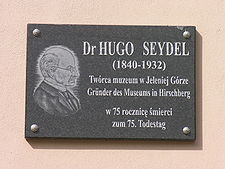Hugo Seydel
Hugo Seydel (born November 12, 1840 in Liegnitz , Lower Silesia ; † October 3, 1932 in Hirschberg in the Giant Mountains , Lower Silesia) was a Prussian politician. He was the founder of the Giant Mountains Museum and the library of the Giant Mountains Association (1914), the first important local museum in Germany.
Life
He was the son of a postal worker. After attending the Liegnitz Knight Academy , he studied law at the Universities of Breslau , Giessen and the Humboldt University in Berlin . He then worked at courts in Liegnitz, Breslau , Muskau and Bunzlau , all in Lower Silesia. During his studies he became a member of the old Breslau fraternity of the Raczeks in 1860 , of the Germania Gießen fraternity in 1861 and of the Brandenburgia / Arminia Berlin fraternity in 1861 .
In the spring of 1885 he was transferred to the Hirschberg district court , where he joined the Riesengebirgsverein (RGV), was elected to its board in 1886 and was its chairman from 1898 to 1921.
From 1896 to 1908 he represented the district of Hirschberg-Schönau in the Prussian House of Representatives in Berlin as a member of the state parliament . In this way he got to know the most important personalities in Berlin and Breslau, whom he was able to win for the major projects of the Giant Mountains Association. In 1907 and 1908 he was a member of the House of Representatives' internal committee and from 1907 to 1911 he was a member of the Central Executive of the National Liberal Party .
Engagement in the Giant Mountains Association
For more than 30 years Seydel was responsible for the road network and road construction in the Giant and Jizera Mountains . The construction of roads in the Giant Mountains was not carried out by the state, but by the Giant Mountains Association, which made the Giant Mountains accessible to tourism. The development of the hiking and toboggan trails, which he intensively pursued, was an essential prerequisite for the increase in visitors in both the summer and winter seasons.
Under Seydel, the RGV created the first collection on the natural and cultural history of the Giant Mountains region, which was initially exhibited in various rented rooms in Hirschberg, until April 14, 1914, thanks to Seydel's efforts, the Giant Mountains Museum (today: "Muzeum Karkonoskie w Jeleniej Gńrze") as the first German museum of local history to be opened.
The wood carving school in Bad Warmbrunn , the center of the arts and crafts in the Giant Mountains, can also be traced back to Seydel's commitment, because in this case, too, he succeeded in convincing the minister of culture in Berlin and obtaining the necessary funds, as the foundation assets, which Adolf Adam von Bruce to found the school, was not enough for permanent operation.
Orders and awards
Seydel's contribution to the Giant Mountains Museum was already recognized when it was opened by the fact that Hirschberg renamed a street near the museum to Seydel Street (now ul. Chełmońkiego ) in his honor . The way to the circlet also bore his name. His general commitment to the Krkonoše Mountains was also recognized in other ways: He was awarded several medals, he was made a Privy Councilor of Justice and an honorary citizen of the city of Hirschberg. The University of Wroclaw awarded him an honorary doctorate and the Giant Mountains Association (RGV) made him its honorary chairman.
Publications
- Memoirs of the Secret Counselor Dr. hc Seydel in Hirschberg from his work in the Riesengebirgsverein , handwriting, Hirschberg 1928. - In 2008 his memoirs were transcribed and at the same time translated into Polish.
- Contributions to the history of the seal stone and glass cutting and the glass production in the Giant and Jizera Mountains . In: “Yearbook of the Silesian Museum of Applied Arts and Antiquities”, page 262, Breslau 1919.
Individual evidence
- ^ Mann, Bernhard (edit.): Biographical manual for the Prussian House of Representatives. 1867-1918 . Collaboration with Martin Doerry , Cornelia Rauh and Thomas Kühne . Düsseldorf: Droste Verlag, 1988, p. 365 (handbooks on the history of parliamentarism and political parties: vol. 3)
literature
- Helge Dvorak: Biographical Lexicon of the German Burschenschaft. Volume I: Politicians. Sub-Volume 5: R – S. Winter, Heidelberg 2002, ISBN 3-8253-1256-9 , p. 425.
Web links
| personal data | |
|---|---|
| SURNAME | Seydel, Hugo |
| BRIEF DESCRIPTION | Prussian politician |
| DATE OF BIRTH | November 12, 1840 |
| PLACE OF BIRTH | Liegnitz , Lower Silesia |
| DATE OF DEATH | October 3, 1932 |
| Place of death | Hirschberg , Giant Mountains , Lower Silesia |
